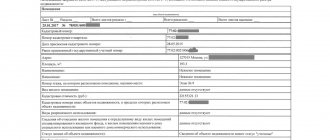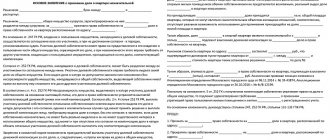Transfer of ownership and date of recognition of income
(Letter of the Ministry of Finance of the Russian Federation dated November 9, 2010 No. 03-03-06/700)
Taxpayer-seller
using the accrual method for the purposes of Chapter 25 of the Tax Code of the Russian Federation, is obliged to
reflect income from the sale
of property
on the date of transfer of ownership
of the specified property to the buyer,
determined
by the taxpayer independently
based on the terms of specific agreements
.
The Ministry of Finance of the Russian Federation came to this conclusion in the commented letter.
What does this mean in practice?
As a general rule, ownership
the goods are transferred to the buyer
at the time of transfer of the goods
.
Art. 491 Civil Code of the Russian Federation
a special procedure for the transfer of ownership
is provided -
ownership
of the goods transferred to the buyer
is retained by the seller until payment for the goods
, that is, ownership of the goods passes to the buyer after full payment for the goods.
Moreover, a special procedure must be provided for in the contract
purchase and sale.
But the buyer has no right
before the transfer of ownership rights to him,
alienate the goods or dispose
of them in any other way, unless otherwise provided by law or contract or does not follow from the purpose and properties of the goods.
Clause 1 Art. 271 Tax Code of the Russian Federation
It has been established that for profit tax purposes,
income is recognized
in the reporting (tax) period in which it occurred, regardless of the actual receipt of funds, other property (work, services) and (or) property rights (
accrual method
).
For income from sales, the date of receipt of income is recognized
date of sale of goods (work, services, property rights), determined in accordance with
paragraph 1 of Art. 39 of the Tax Code of the Russian Federation
, regardless of the actual receipt of funds (other property (work, services) and (or) property rights) in payment.
Back in 2006, the Ministry of Finance of the Russian Federation stated that revenue
from the sale of goods for tax purposes, profit
should be recognized on the date of the actual transfer of goods
to buyers and the issuance of settlement documents to them, since this approach allows us to reflect
the actual relations
that have developed between the seller and the buyer of goods received under a sales contract
with a special procedure for the transfer of ownership
(letter dated September 20, 2006 No. 03-03-04/1/667).
That is, even if the purchase and sale agreement establishes that ownership of the goods is transferred
to the buyer
after payment
, the seller must take into account income for tax purposes
on the date of actual transfer of the goods
.
To justify their position, officials referred to the opinion of the Presidium of the Supreme Arbitration Court of the Russian Federation
, expressed in paragraph 7 of Information Letter No. 98 dated December 22, 2005.
The court, when determining the date of receipt of income from the sale of goods using the accrual method, did not take into account the condition of the sale and purchase agreement on the retention of ownership rights
for the transferred goods to the seller until full payment by the buyer.
According to the court, when taking into account income from the sale of goods for tax purposes in accordance with Art. 39, paragraph 3 of Art. 271 of the Tax Code of the Russian Federation
should not take into account the provisions of the agreement on the retention of ownership rights by the company until full payment for the goods
.
However, the Ministry of Finance selectively used the court's opinion as its own argumentation.
The Presidium of the Supreme Arbitration Court of the Russian Federation issued its verdict on a specific case and taking into account specific circumstances
, indicating that such a conclusion is due to the fact that
the condition
on the special procedure for the transfer of ownership
did not reflect the actual relations of the parties
and the real financial and economic results of their activities, that is, the parties
did not ensure compliance with the terms of the agreement on maintaining the ownership of the goods by the seller
.
Therefore, the specified agreement of the parties, not reflecting their actual relations and real financial and economic results of activities, cannot be taken into account for tax purposes.
The new version of the Ministry of Finance practically allows the taxpayer-seller to painlessly take into account income on the date of payment for the goods by the buyer
, if the terms of the contract provide for
a special procedure for the transfer of ownership
.
In particular, in cases where ownership of the goods passes to the buyer at the time of payment, and the moment of payment is the full repayment of the loan to the bank
taken by the buyer to pay for the goods.
Let us remind you that any “special” situation with the transfer of ownership must be clearly and clearly stated in the contract
.
However, as a rule, any good news also has negative companions.
Even if you recognize income at the time of payment for the goods, VAT will be charged at the time of shipment
.
According to the Ministry of Finance of the Russian Federation, if under a supply agreement shipment
was made in one tax period, and
ownership passes to the buyer in another tax period
, then VAT should be charged in the tax period
in which the shipment was made
, regardless of the moment of transfer of ownership (letter dated 09/08/2010 No. 03- 07-11/379).
Officials justify their position by the fact that, in accordance with paragraph 1 of Art. 167 of the Tax Code of the Russian Federation,
the day of shipment
(transfer) of goods (work, services), including before their payment, is
the moment of determining the tax base for VAT
.
In addition, on the basis of clause 3 of Art. 168 Tax Code of the Russian Federation
When selling goods, the corresponding
invoices
are issued no later than five days, counting
from the day of shipment of the goods
.
Despite the controversial nature of this position, this is precisely the conclusion that follows from the current norms of Chapter 21 of the Tax Code of the Russian Federation, according to which sales (transfer of ownership) and shipment are in no way related to each other.
How to determine the date of transfer of ownership?
How to determine the date of transfer of ownership if:
- no supply agreement has been concluded
or
- The supply contract has been concluded, but it does not indicate anything about the date of transfer of ownership?
The right of ownership of the acquirer of a thing under a contract arises from the moment of its transfer, unless otherwise provided by law or contract (clause 1 of Article 223 of the Civil Code of the Russian Federation). If the alienation of property is subject to state registration, the acquirer’s right of ownership arises from the moment of such registration - unless otherwise provided by law (clause 2).
Transfer is recognized as the delivery of an item to the acquirer, delivery to a carrier for shipment to the acquirer, or delivery to a communications organization for forwarding to the acquirer of things alienated without the obligation of delivery (Article 224 of the Civil Code of the Russian Federation).
The thing is considered delivered to the acquirer from the moment it actually comes into the possession of the acquirer (or the person indicated by him).
These are the general norms.
Now, regarding the purchase and sale agreement, including delivery: if such an agreement provides for the delivery of goods to the buyer, the seller’s obligation to transfer the goods is considered fulfilled (Article 458 of the Civil Code of the Russian Federation):
- at the time of delivery to the buyer,
- if delivery is not provided - at the time of transfer of the goods to the carrier or other organization for delivery.
Accordingly, at the same moments the ownership of the goods also passes. The date of shipment is the date of delivery of the goods to the buyer (for pickup) or the date of delivery to the carrier (the date stamped by the carrier on the waybill (shipper’s copy).
Let us note that the above rules are dispositive in nature, that is, they allow the parties to the agreement to establish other moments of the transfer of ownership (the moment of payment, for example, etc.).
In cases of non-contractual transfer of a thing, the transfer of ownership is regulated by law. It can be:
- ownerless things (Article 225 of the Civil Code of the Russian Federation),
- abandoned things (Article 226 of the Civil Code of the Russian Federation),
- finds (Articles 227, 228 of the Civil Code of the Russian Federation),
- treasures (Article 233 of the Civil Code of the Russian Federation), etc.
There is also such a concept as “acquisitive prescription” - the acquisition of a right due to long and open ownership (Article 234 of the Civil Code of the Russian Federation).
See also:
- Accounting policy for accounting of goods
Did the article help?
Get another secret bonus and full access to the BukhExpert8 help system for 14 days free of charge
Related publications
- How to reflect shipment without transfer of ownership upon prepayment? ...
- How to reflect the shipment without transfer of ownership? Payment after shipment...
- How to upload shipment from 1C UT to accounting 1C without transfer of ownership In 1C: Enterprise 8.3 (8.3.16.1148) “Trade Management”, edition 10.3 (10.3.50.1) we make shipments...
- What date of acceptance of goods for registration should be reflected in the import purchase book: the date of transfer of ownership or the date of the customs declaration? ...
How is the moment of transfer of ownership determined?
As already mentioned, according to the general provision established by Art.
223 of the Civil Code of the Russian Federation, ownership of the goods passes at the moment of its transfer to the buyer or carrier. But this rule is dispositive, because the buyer can indicate in the accompanying documents the conditions that suit him specifically. As a rule, the following cases are considered the most common when ownership is transferred:
- Upon payment.
It is provided that the right of ownership of the goods passes at the moment of transfer to the seller of the full cost of the purchased products. - Expiration of a specific period.
Full transfer of rights is carried out only after a certain period of time specified in the contract.
The seller has the right to regulate the terms of transfer by specifying additional conditions in the contract.
Accordingly, the moment of transfer is determined according to the documentation. The conditions for transferring ownership of goods may change by mutual agreement of the seller and buyer. Moreover, they may differ both from those conditions that were established earlier, and from those prescribed in Art. 223 Civil Code of the Russian Federation.
Transfer of ownership upon delivery of goods
A supply agreement is the most common type of document in economic relations between individuals and legal entities.
It relates to business documentation, therefore one of the parties appearing in it must be an entrepreneur. As a rule, the transfer of ownership of goods under a supply contract is carried out upon delivery to the buyer. But, as in any situation, other conditions may be agreed upon by the seller and buyer:
- transfer of goods to the carrier;
- upon payment;
- delivery of goods to the buyer;
- counter delivery, etc.
Consequently, the procedure for transferring ownership of goods under a supply agreement is regulated in the same way as in the case of a direct purchase. More details about the moment of transfer of ownership of a product can be seen in the video:
Transfer of ownership of goods upon import
In accordance with the rules, the moment of transfer of ownership of goods upon import can be stipulated in a foreign trade contract.
Again, the seller has the right to set the conditions for such a transfer: fact of payment, transfer to the courier, arrival at the buyer’s warehouse, etc. If specific conditions are not specified in the contract, then the moment of transition is determined in accordance with the relevant legislative acts of the seller’s country. In addition, when registering imported goods, accountants often resort to registering them using the Incoterms system, which provides for the date of transfer of risks for death or damage to inventory items. This is the most optimal approach and significantly simplifies the regulation of certain legal and economic aspects.
Regulation of issues related to the transfer of rights to goods during import has many different nuances and subtleties, so you should not rely only on yourself. It is best to contact a specialist who can arrange everything correctly.
Transfer of ownership of goods - general provisions
The transfer of ownership of a product is the most important mechanism for regulating economic relations, which establishes the procedure for transferring products and the right to own them to the buyer.
The general provision of this procedure is regulated by Art. 223 of the Civil Code of the Russian Federation, which states that the right of ownership arises upon the transfer of products, unless otherwise specified in the contract or other related documentation. Under transfer, according to Art. 224 of the Civil Code of the Russian Federation, implies the delivery of material value and accompanying papers to the buyer or carrier. According to the Civil Code (Part 1 of Article 455), a product can be any item that complies with the rules of trade turnover.
It is usually understood that the buyer of a product acquires ownership of it solely upon payment of its full price. This allows the seller to protect himself from fraud, late payments or complete refusal of them. If this happens, he can file a lawsuit. In addition, at the request of the seller, the conditions for transfer of ownership can be revised.
Upon receipt of ownership, the buyer receives:
- powers assigned to owners;
- risks of product damage;
- the risk of seizure of the goods or the possibility of transferring debts to the item;
- costs of maintaining purchased products.
That is, at the moment of transfer of rights to the product, the buyer becomes the full owner of this product.
Transfer of goods without transfer of ownership
In modern practice, organizations often transfer goods without providing ownership rights. Typically this happens in the following cases:
- Transfer of goods for sale.
In this case, the seller transfers the products to another company for further sale. - Transfer under an exchange agreement.
This practice is common in barter transactions, when one company provides another with goods and materials on condition of exchange. - Transfer under a contract with the condition of deferment.
It often happens that products are transferred to the buyer on the basis of transfer of ownership rights after a certain period.
The transfer of ownership of the goods is usually carried out upon its transfer and full payment, but there may be special conditions. In some cases, it is possible to transfer products without transferring ownership of them. If it is necessary to stipulate at what point ownership of the goods will pass to the new owner, the conditions are specified in the contract.




